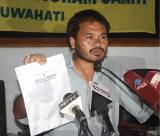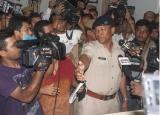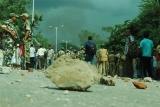Archives
ROADSIDE RAMPAGE
 The police personnel on duty including the city police chief Dipak Choudhury were severely injured in the incident. Later the District Magistrate J. Balaji and senior police officials including Inspector General (law and order) B. J. Mahanta, inspector-general (central and western range) Pallab Bhattacharya arrived on the spot and the situation was finally brought under control.
The police personnel on duty including the city police chief Dipak Choudhury were severely injured in the incident. Later the District Magistrate J. Balaji and senior police officials including Inspector General (law and order) B. J. Mahanta, inspector-general (central and western range) Pallab Bhattacharya arrived on the spot and the situation was finally brought under control.
 Initially the gathering of over 5000 agitators in the Dispur locality of Guwahati was non-violent in nature and after the peaceful demonstration, the demonstrators wanted to hand over a memorandum to the Forest Minister Rockybul Hussain or the Chief Secretary NK Das, neither of whom came out to receive it. Finally the protesters demanded that the Kamrup (Metro) Deputy Commissioner J. Balaji should come to receive the memorandum.
Initially the gathering of over 5000 agitators in the Dispur locality of Guwahati was non-violent in nature and after the peaceful demonstration, the demonstrators wanted to hand over a memorandum to the Forest Minister Rockybul Hussain or the Chief Secretary NK Das, neither of whom came out to receive it. Finally the protesters demanded that the Kamrup (Metro) Deputy Commissioner J. Balaji should come to receive the memorandum.
The District Magistrate honored the demand but the patience of the protestors was tried as the District Magistrate took time to do so.
Suddenly the police turned aggressive and a young boy was killed when an officer opened fire. That was the spark which ignited the flames and all hell broke loose.
| The pioneer pressmen’s organization argued that it ‘does not have any intention to safeguard anybody against the law and was in no way interested in preventing the arrest of Mr. Gogoi, but he should have been allowed to complete the press meet and could have been arrested outside the campus of the Press Club’. |
Most of the participants of the protest demonstration came from various localities of the city including Gaurchak, Chachal and Shilsako. Those people, now residing on the hills of the city are being subjected to eviction drives conducted by the authorities from time to time. Nearly 80,000 families have been residing in the city hills under the territory of reserve forest for many years and they maintain their demand for ‘mati pattas’ (settlement rights).
The police firing and the mob violence on June 22nd was condemned by socio-political groups and parties. The opposition party Asom Gana Parishad and the Communist Party of India (Assam State unit) condemned the police action against the protesters. The CPI, Assam came out with the statement that ‘if Indian citizens are occupying land at forest reserve, the landless Indian citizens should be rehabilitated to some other suitable place instead of evicting them haphazardly’.
Two active student organizations of the state had condemned the police atrocities on the agitators and also criticized the violent methods adopted by the protesters.
|
Save Guwahati Build Guwahati were dismayed by the violence on the day and reiterated that ‘violence can solve no problem’. The SGBG President Dhiren Barua even criticized the leaders of the protest march (read Akhil Gogoi) claiming that they had failed to lead the agitation peacefully and resorted to violence. |
The All Assam Students’ Union, in a statement issued by its advisor Samujjal Bhattacharya, President Sankar Prasad Rai and General Secretary Tapan Kumar Gogoi, ASU, condemned the police firing and ‘lathi-charge’ on the agitators.
They also expressed dismay at the mob violence. The student body urged the government to ‘adopt a scientific approach to preserve the hills and wetlands of the city’.
Similarly the Asom Jatiyatabadi Yuva Chatra Parishad came out with a statement condemning both the police firing and unruly behaviour of the protesters. The students’ organization demanded that the indigenous people residing in the hills for years must get the land pattas.
Even the banned United Liberation Front of Assam (Parua Barua faction) issued a statement condemning the Assam Police for its ‘complete colonial attitude against the indigenous people of Assam’. The armed outfit also extended its support to the ongoing agitation by the indigenous people for their land rights.
The statement meanwhile dared the Tarun Gogoi government to evict tea estate owners (from outside the state) and the illegal Bangladeshi migrants from Assam while also appealing to the common people to support their movement for a ‘Swadhin Asom’ (independent Assam).
 A prominent English daily of Northeast India, asserted in a front page column that, “There is a doubt among the people that the incident occurred as the KMSS leader failed to control the unruly protesters who went berserk. Do the protesters have the right to damage public property? How could they torch Assam State Transport Corporation buses, private vehicles and police vehicles? The irony is that all these vehicles were seen burning just a few yards from the Dispur Fire Brigade office and the police remaining a mute spectator.”
A prominent English daily of Northeast India, asserted in a front page column that, “There is a doubt among the people that the incident occurred as the KMSS leader failed to control the unruly protesters who went berserk. Do the protesters have the right to damage public property? How could they torch Assam State Transport Corporation buses, private vehicles and police vehicles? The irony is that all these vehicles were seen burning just a few yards from the Dispur Fire Brigade office and the police remaining a mute spectator.”
The authority had charged Akhil Gogoi, also a Right To Information activist, with as many as 10 cases of illegal meeting, rioting, arson and damaging public property etc under various sections of the Indian Penal Code (IPC) including 143, 144, 147, 149, 333, 339, 353, 357, 427, 434, 435 and 436. There is suspicion that the Assam government might take the activist under National Security Act to confine his movement for a few months.
The intention of the government turned clear when Akhil Gogoi was arrested on June 24th from the campus of the Guwahati Press Club, while he was addressing the media. Akhil claimed that ‘no member of KMSS was involved in the clash with police and torching of vehicles (on June 22)’. The journalists attending the meet requested the police officials to wait for some time till Akhil Gogoi completed his version of the story but they whisked him away in full views of reporters and television cameras at the press club premises.
The KMSS immediately called for a 12-hour Assam Bandh the next day protesting against the arrest of Akhil Gogoi and this was supported by many organizations. The bandh on June 25 was successful, as the busy Guwahati city wore a deserted look. The shops and other business offices remained closed and there was very little traffic on the streets.
Guwahati Press Club protested the arrest of Akhil Gogoi from inside its premise. Sending a protest letter to the State Chief Minister Tarun Gogoi, the pioneer pressmen’s organization argued that it ‘does not have any intention to safeguard anybody against the law and was in no way interested in preventing the arrest of Mr. Gogoi, but he should have been allowed to complete the press meet and could have been arrested outside the campus of the Press Club’.
Facing the heat, the Chief Minister announced that the State Government would adopt a land policy taking consideration of thousands of landless people because of flood, erosion and other natural and man-made disasters. Issuing a statement on June 25th, the State Government Chief Tarun Gogoi assured that the interest of indigenous people, poor and marginalized sections of the society would be protected.
Public activist Professor Deven Dutta expressed concern that the authority, various political parties and different non-government organisations are playing double standards on the issue of encroachment (in forest land and other government land) and eviction.
The large-scale encroachment is creating an alarming situation in the state but the opportunistic stands of successive governments and different parties and organisations stemming largely from their vested interests are only complicating the situation further, asserted Professor Dutta.
“On the one hand, successive governments, political parties and other organisations (both political and non-political) call for protection of forests, wildlife, biodiversity and the environment and on the other, the same apostles would support the illegal encroachers by siding with them when it comes to evicting them,” he concluded saying that this kind of double standard attitude is only creating a situation of chaos and confusion.
Nava Thakuria

